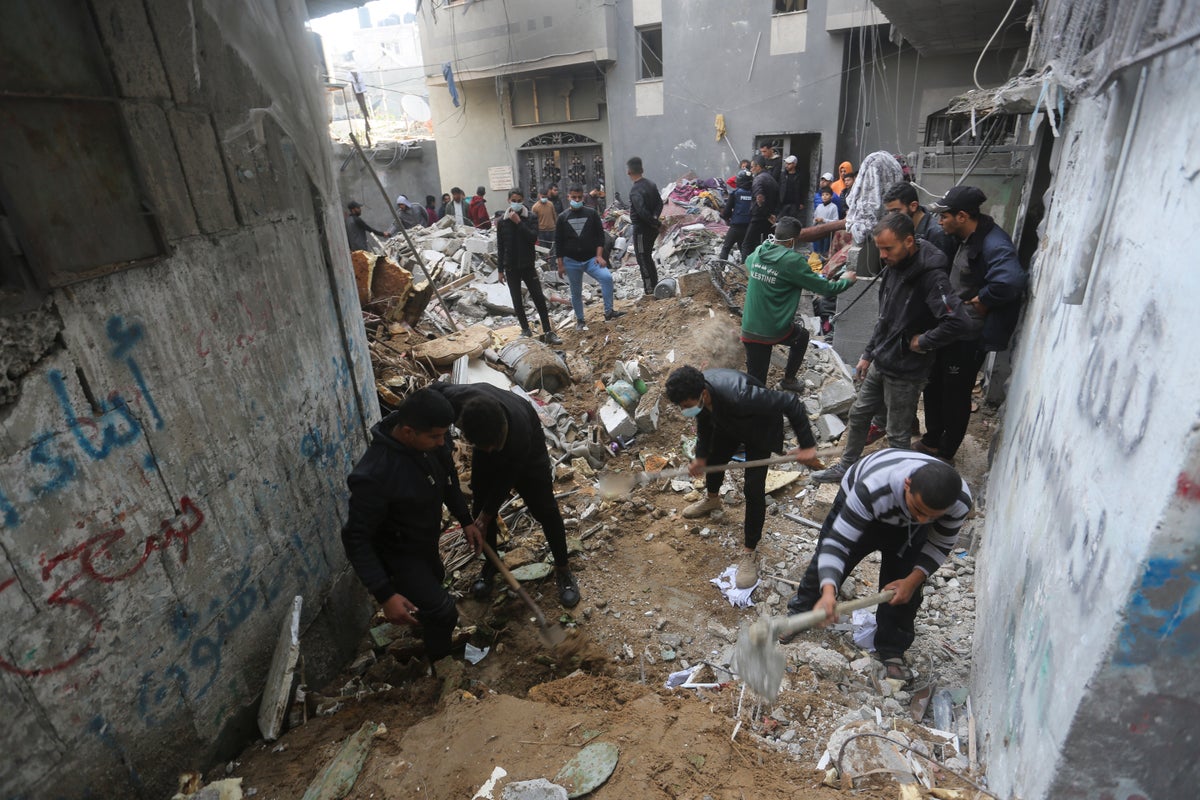
US Secretary of State Antony Blinken has stepped up criticism of Israel’s military operation inside Gaza, saying that there is a “gap” between Israel’s statements on protecting civilians and what Washington is seeing on the ground.
It comes after he told CNN that Israel “cannot” allow the the civilian casualty rate in northern Gaza to be repeated as the military moves south.
“As we stand here almost a week into this campaign into the south … it remains imperative that Israel put a premium on civilian protection,” Mr Blinken said at a press conference after a meeting with British foreign secretary David Cameron in Washington.
“And there does remain a gap between ... the intent to protect civilians and the actual results that we’re seeing on the ground,” Mr Blinken said.
Mr Blinken has consistently been one of the Biden administration’s most vocal critics of Israel’s military campaign while President Joe Biden himself has taken a much more reserved tone when describing the humanitarian crisis developing in the occupied Palestinian territory. Mr Biden has even questioned the official death toll put out by Gaza’s health ministry, a figure that Israel Defense Forces (IDF) personnel reportedly believe to be roughly accurate.
The secretary’s conversation with longtime anchor Gayle King and basketball star Charles Barkley raised eyebrows on X/Twitter for the sheer surrealness of the spectacle; a former NBA star with little background in politics interviewing the top US diplomat in the world about a bloody military campaign. It aired on CNN as Republican 2024 presidential candidates minus Donald Trump gathered on upstart cable rival NewsNation for the fourth and final primary debate of 2023.
Mr Blinken was asked by King if he believed that Israel’s military was truly doing enough to mitigate civilian deaths and injuries given that an invasion of southern Gaza has reportedly begun over the past few days.
“[I]n the south, what we’re seeing – and I said to them very clearly when I was there just a week ago: We cannot have a repeat of what happened in the north in the south in terms of harm being done to civilians, and also making sure that humanitarian assistance is getting to people who need it, who are in desperate need of food, of water, of shelter,” the secretary responded.
He went on to say that while Israel’s military was taking “important steps” to keep civilians out of harm’s way, there was more to be done: “On the other hand, there’s more that has to happen, that needs to be done: making sure that people have safe corridors in order to get from areas that could be in danger to places where they’ll be safe; making sure that those areas where they’re going to have the proper resources, have the food, have the water, have the medicine to care for them while they’re in those areas.”
Israel’s prime minister, Benjamin Netanyahu, struck a different tone as he inspected an IDF base with the force’s chief of staff this week.
“I also suggest that our enemies pay attention to this spirit because if Hezbollah decides to open an all-out war, then with its own hands it will turn Beirut and southern Lebanon, which are not far from here, into Gaza and Khan Yunis,” he threatened, according to a transcript provided to The Independent.
Mr Blinken was in Israel just last week and has been across the region several times as he serves as the US’s frontman amid the crisis in Gaza. At the top of the administration’s priority list is keeping the conflict in the Gaza Strip from spilling into the West Bank, or worse: into a regional conflict involving Iranian-backed militias like Hezbollah in Lebanon.
So far, those latter efforts have been largely successful, as administration officials publicly threaten Iran with consequences should those militia groups become directly involved. But attacks presumed to have been directed by Iranian-backed Houthi militants in Yemen against a US warship and international merchant vessels on Sunday have thrown the future into question; neighboring officials in Saudi Arabia, which has long waged war against the Houthis, have reportedly urged Washington to show restraint in its response.
There may be an immediate political reason for Mr Blinken’s remarks as well.
Earlier this week, a group of Democratic senators led by Bernie Sanders reportedly issued a blunt warning to the White House behind closed doors: if the administration wants more military aid to pass through the closely-divided upper chamber of Congress, more steps must be taken to curtail Israel’s killing of civilians in its efforts to destroy Hamas.
Mr Sanders addressed the issue in a Senate floor speech; with the combined opposition of progressives and Republicans who have balked at separating aid for Israel from funding for US border security measures, the prospect of passing such aid is now in real jeopardy.
“The truth is that if asking nicely worked, we wouldn’t be in the position we are today,” he said. “The blank-check approach must end.”







